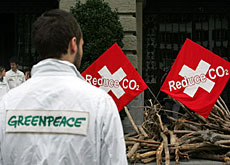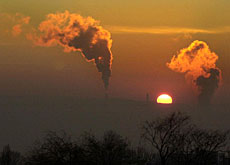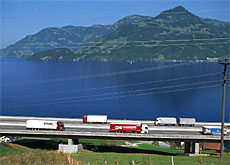Greenpeace calls for a climate council

The environmental organisation Greenpeace is calling for a national climate council to introduce immediate measures to reduce carbon dioxide emissions.
By demonstrating outside the parliament in Bern on Monday, Greenpeace wanted to ensure that it wasn’t just business as usual after the floods in August.
The organisation said that in the autumn parliamentary session the Swiss government should set up a committee comprising the “most able and progressive thinkers”.
This committee’s goal would be to come up with a plan, within a year, on how to reduce by 30 per cent by 2020 the amount of carbon dioxide emissions in Switzerland compared with 1990 levels.
Greenpeace reinforced their demands by staging a demonstration reminding people of the devastating floods in August.
Just before the start of the session, Greenpeace activists blocked the parliament’s main entrance with debris and driftwood from the floods.
“Whoever just goes back to business as usual does not understand what the climate change means for alpine Switzerland,” said Alexander Hauri from Greenpeace.
“The manmade climate change must come at the very top of the list of topics to be discussed.”
Emergency motion
In the course of the three-week agenda, both chambers are due to discuss the floods which hit Switzerland at the end of August, causing SFr2 billion ($1.6 billion) in damage and leaving six people dead.
The Green Party has passed an emergency motion in which it demands that the government take a greater responsibility and that the government take measures in the areas of climate protection, water management and development plans as quickly as possible in order to reduce the threat of flooding.
Floodwater protection in Switzerland is the domain of the cantons but the government oversees the programme. The government, cantons and communes share the costs.
The mayor of the capital, Bern, where the Matte district was partially submerged by flooding, has openly accused cantonal authorities of shirking their responsibilities.
swissinfo with agencies
The Swiss parliament ratified the Kyoto Protocol in June 2003.
Under Kyoto, Switzerland has pledged to reduce carbon dioxide emissions from fossil fuels to 10% below 1990 levels by 2010.
It has also pledged to cut emissions by 1.8 million tons a year between 2008 and 2012.
To this end a surcharge has been imposed on heating oil and a climate tax will be levied on petrol and diesel from October 1.
In the last ten days of August, parts of Switzerland were hit by floods and landslides.
The floodwaters came unexpectedly quickly, causing SFr2 billion ($1.6 billion) in damage and leaving six people dead.
It was the largest amount of rainfall since 1999.
The worst flooding last century was in 1987, when SFr1.7 billion in damage was caused.

In compliance with the JTI standards
More: SWI swissinfo.ch certified by the Journalism Trust Initiative











You can find an overview of ongoing debates with our journalists here . Please join us!
If you want to start a conversation about a topic raised in this article or want to report factual errors, email us at english@swissinfo.ch.